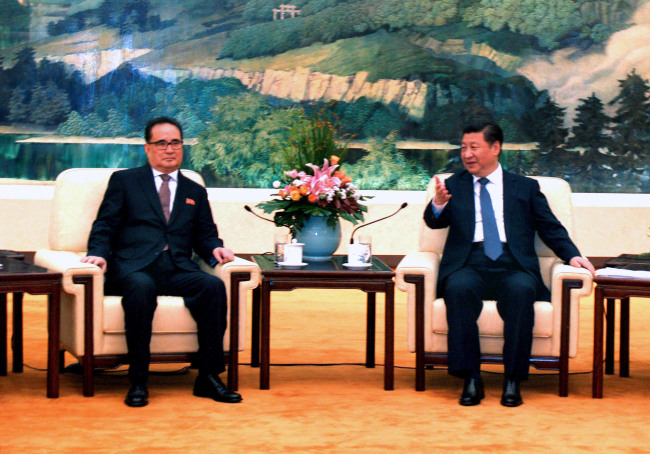Strained ties between North Korea and China would not undergo a turnaround even if Beijing sends a high-ranking official to Pyongyang at a key anniversary next month, an expert at Seoul's think tank said Sunday.
North Korea and China will mark the 55th anniversary of the signing of a military treaty on July 11 amid the possibility that Beijing may send a high-ranking official to Pyongyang in return for the latest visit by the North's party official Ri Su-yong to China.

Chinese President Xi Jinping (Right) meets Ri Su-yong, vice chairman of North Korea's ruling Workers' Party, in Beijing on June 1. (Yonhap)
Also on July 27, North Korea will mark the 63rd anniversary of what it claims is its victory in the 1950-53 Korean War, which ended in a truce. China fought alongside the North against South Korea, the United States and the U.N. forces.
Lee Ki-hyun, a research fellow at the Korea Institute for National Unification, said that even if China sends its delegation to the North next month, it won't be easy to expect a major shift in their bilateral ties due to Pyongyang's nuke arsenal.
"At a time when China vowed to faithfully implement U.N. sanctions against the North, it won't be easy for their frayed ties to be improved if Pyongyang sticks to its nuclear program," Lee told a forum on North Korea.
Ri, a vice chairman of the ruling Workers' Party, made a rare visit to China in late May in an apparent bid to improve strained ties with Beijing following Pyongyang's nuclear tests.
The North's official highlighted the country's commitment to simultaneously pursue nuclear and economic development during his talks with Chinese President Xi Jinping.
Lee said China's possible move in July would follow a similar pattern of a reciprocal trip made by Chinese Vice President Li Yuanchao in 2013.
Li visited Pyongyang to attend a ceremony to mark the 60th anniversary of the signing of the Armistice Agreement in July 2013 following the North's official Choe Ryong-hae's trip to Beijing.
"China would hope to persuade North Korea to change its behavior, but the North would not accept it. Even if a ranking Chinese official visits the North, it would be difficult to expect a positive outcome," Lee said.
Meanwhile, Choi Jin-wook, president at the KINU, said that if the North ends its call for Seoul and Washington to suspend their joint military exercises, it may be possible to begin denuclearization talks with North Korea at a level similar to the "Leap Day" agreement.
Under the Feb. 29, 2012, deal, also known as the "Leap Day" agreement, the U.S. promised to provide 240,000 tons of food aid in exchange for the North taking a series of denuclearization "pre-steps," such as a moratorium on nuclear and missile tests. (Yonhap)



![[KH Explains] No more 'Michael' at Kakao Games](http://res.heraldm.com/phpwas/restmb_idxmake.php?idx=645&simg=/content/image/2024/04/28/20240428050183_0.jpg&u=20240428180321)


